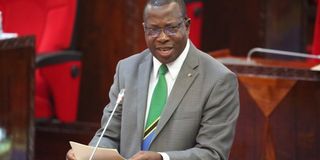How will Tanzania government finance its 2019/20 Budget? That is the big question

Minister for Finance and Planning, Dr Philip Mpango
What you need to know:
Ernest and Young, country managing partners, Joseph Sheffu said, the governments’ decision to roll out the blue print aims at resolving major bottlenecks facing business was an important milestone.
Dar es Salaam. Observers continue to analyse the government budget for the 2019/20 financial year which was tabled in Parliament for debate last Thursday.
As soon as the budget proposals were formally presented in the National Assembly meeting in the capital Dodoma by the minister for Finance and Planning, Dr Philip Mpango, some analysts expressed concern over its implementation.
Speaking during a post-budget analysis meeting organised by the audit firm KPMG the day after the 2019/20 Finance Bill was tabled, an economist from the University of Mzumbe, Prof Honest Ngowi, and an associate director for Tax and Regulatory Services, Mr Nsanyiwa Donald, raised some key issues to the effect that the new budget is unrealistic from the economics point of view.
The new budget is to a tune of Sh33.1 trillion, an increase of 1.9 per cent over the current (2018/19) budget.
Prof Ngowi questioned how the government would achieve the lofty targets intended in the new budget when it has failed to do in previous budgets.
“The government has collected only 87 per cent of its revenue target in the current budget; it has collected only Sh12.09 trillion out of the Sh18 trillion it pledged. Yet, it has increased projected collections to Sh19 trillion in 2019/20,” he said.
“Although many MPs hailed the grandiose reforms pledged in the 2019/20 budget, I doubt if the government can achieve the intended targets during implementation,” he stated.
For his part, the associate Tax director at KPMG, Mr Donald, urged the government to zero-rate value-added tax (VAT) on sanitary pads.
“We see the government withdrawing the VAT exemption on sanitary pads, claiming that the exemption only benefited suppliers rather than end-users,” he noted.
In another forum organised by Ernst & Young, participants proposed the establishment of soft infrastructure – mainly digital infrastructure, which is fast becoming a global culture.
Addressing the forum, the Mzumbe University Professor Honest Ngowi said the national economy has been growing at 6.9 per cent per annum -- and the government has been implementing infrastructural projects like the Standard Gauge Railway (SGR) and the Stiegler’s Gorge hydropower dam.
In that regard, he proposed that the projects should embrace the ‘local content’ conception so as to contribute to economic growth.
“Most of these projects are implemented through loans and, for the benefits to trickle down to the economy, local content is essential,” he said.
To unlock potential capacities, Prof Ngowi said, there is need to also embrace soft infrastructure along with hard infrastructure.
On her part, an economist from the Research and Poverty Alleviation (Repoa), Ms Blandina Kilama, said it is good that the government has accorded precedence to agriculture, as the people most engaged in the sector are in rural areas – mostly women.
Ms Kilama also said that the new budget proposes a lot of reforms to the policy and regulatory frameworks which were a stumbling block for businesses.
“All the proposed reforms should not just end on paper,” she said.
Ernst & Young country managing partner Joseph Sheffu said that the governments’ decision to roll out the blueprint – which aims at tackling major bottlenecks in business – is an important milestone.
In his post-budget analysis, ACT Wazalendo leader Zitto Kabwe said the new budget is set “to develop things than people” – infrastructure projects vis-à-vis social services such as education, health and water.
He also said that the economic growth has not been proportional to the ‘growth’ of individual economies, as the GDP per capita growth has invariably been lower than the national economic growth. Mr Kabwe also said that implementation of the budget is challenging because budgeted funds are not released in time or in full.




